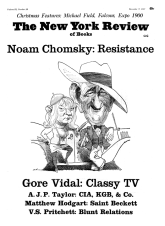In response to:
Crier in the Wilderness from the August 24, 1967 issue
To the Editors:
I have read Robert M. Adams’s illnatured review of Edward Dahlberg’s Epitaphs of Our Times [NYR, August 24] and his replies to the replies of Mr. Dahlberg, Isabella Gardner, and Harold Billings [NYR, October 12 and 26], with amusement not unmixed with contempt. Not having any academic career to forward, and being merely a working editor in the house of the publisher, I did not think it necessary to use Mr. Dahlberg’s book to call attention to myself as its editor. If Mr. Adams thinks this was coyness on my part, that’s his problem. I do object, however, to his questioning my judgment in refusing to censor Mr. Dahlberg by omitting a letter that he (Mr. Adams) does not, approve of. He says that if I were “a sensible or sensitive person” I would have known better. I am definitely not sensible, but I am frightfully sensitive in the presence of a literary assassin. Mr. Adams’s self-righteousness gives me a pain in that part of my anatomy that occupies an editor’s chair.
Edwin Seaver
New York City
Robert M Adams replies:
Oh, come off it, Mr. Seaver, I didn’t want you to impose a censorship on Edward Dahlberg, and you know I didn’t. You were an editor, right? and it’s an editor’s business to select among his materials, in order to make a proper book out of them. So you did that, producing what you nicely call an “epistolatory sampler.” And it’s a reviewer’s business to express freely his judgment about the literary qualities of the finished product. Okay, so far? Now, if one reviewer says he doesn’t think much of one editorial option—is that literary assassination? Try to believe this: Nobody has to be bribed to find Epitaphs of Our Times a really bad book. The Dahlberg Reader is another matter; there are some interesting and moving things in it, as my original review said. But the fact is, Dahlberg’s not an easy man to appreciate (don’t yelp now, I’ve heard that said about Dante too), and his case will be advanced a good deal faster by pointing out the places where he’s good and the ways in which he can be appreciated, than by impugning, in ignorance and malice, the motives of reviewers.
This Issue
December 7, 1967



